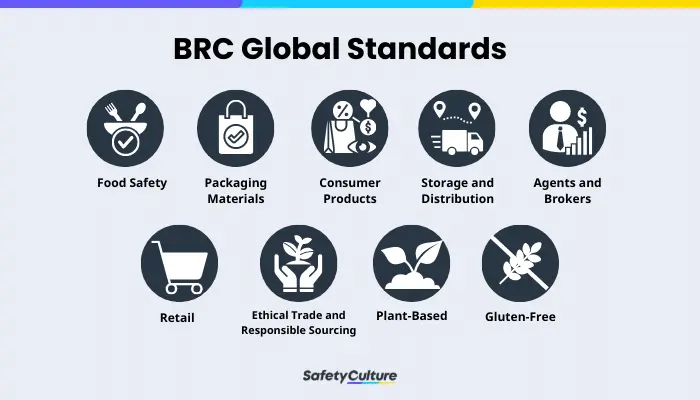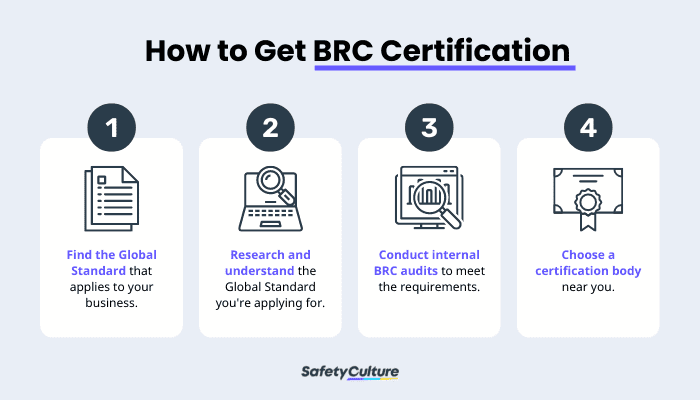What is the British Retail Consortium?
The British Retail Consortium (BRC) is a trade association founded by retailers in the UK in 1992. It aims to promote the interests of retailers across different sectors by providing training, expert advice, quality benchmarking, and related services. Among the most important contributions of the BRC is the Global Food Standard for Food Safety in 1998, which has become a hallmark of food safety standards across the globe.
What are the British Retail Consortium Global Standards?
The BRC Global Standards are among the leading safety and quality certification programs across the globe. They comprise nine standards across a variety of sectors in retail and manufacturing.
This benchmarking by the BRC began with the BRC Global Standard for Food Safety in 1998 and has expanded to other areas such as Retail, Consumer Products, Packaging Materials, and more. In February 2019, it rebranded itself as the Brand Reputation through Compliance with Global Standards (BRCGS).
This section explores each of the global standards under the BRCGS.

BRC Global Standards
Global Standard on Food Security
The BRC Global Standard for Food Safety was first developed by food industry experts in the British Retail Consortium. It offers a comprehensive set of standards for food safety, product integrity, quality, and legality. It touches upon various operational controls for manufacturing, handling, and processing food products.
Now in its eighth version, the Global Standard for Food Safety has received recognition from the Global Food Safety Initiative (GFSI). This governing body aims to harmonize global food safety systems and improve the safety and quality of food products.
Global Standard for Packaging Materials
The Global Standard for Packaging Materials is an international industry benchmark for safe, quality, and legal packaging products. It evaluates a product’s quality, authenticity, and compliance with existing laws and regulations to meet consumer needs. This standard is ideal for all producers and suppliers of packaging materials.
Global Standard for Consumer Products
The Global Standard for Consumer Products aims to foster best practices and mitigate risks in producing consumer products. Manufacturers, retailers, and specifiers of non-food raw materials and finished products belong to this type of certification.
This certification program consists of two levels:
- Foundation: entry-level standards for companies with low-risk products and basic processes
- Higher: rigorous standards for companies with high-risk products and advanced systems
The BRC Consumer Products Standard also provides two parts to accommodate different product types:
- General Merchandise: furniture, electrical equipment, textiles, and toys
- Personal Care and Household: medical devices, cleaning aids, cosmetics, and food wraps
Global Standard for Storage and Distribution
The Global Standard for Storage and Distribution deals with the transport and logistics side of the supply chain. It sets a benchmark for safely transporting products and managing risks along the way. It emphasizes good operating and handling practices in distributing food and non-food products across supply chains.
This standard applies to companies with logistical operations in food, consumer, and packaging products.
Global Standard for Agents and Brokers
The Global Standard for Agents and Brokers targets the non-manufacturing sectors in product management systems. It establishes transparency measures and traceability chains for companies involved in product trade.
Establishments that fall under this umbrella include those who purchase, sell, and facilitate the trading of food and non-food products, such as:
- Agents of non-manufacturing businesses
- Brokers
- Exporters and importers
Global Standard for Retail
Just like its name suggests, the Global Standard for Retail provides a quality management framework specifically for retailers. It guarantees safe and quality products for consumers by setting relevant benchmarks for delivering services and goods to the public. This standard includes metrics for management control systems in retail service providers.
Companies involved in the retail of food and other consumer goods can get certified for this program.
Global Standard for Ethical Trade and Responsible Sourcing
The Global Standard for Ethical Trade and Responsible Sourcing establishes criteria to promote sustainable operation and management systems. It furthers transparency across supply chains and upholds worker rights through security protocols, fair work practices, safe working environments, and other initiatives. Legal, moral, and safety obligations fall under this standard.
This certification standard has received acknowledgment from the Sustainable Supply Chain Initiative (SSCI), a program under the Consumer Goods Forum (CGF). It covers the following industries:
- Manufacturing
- Secondary packaging or processing
- Storage and distribution facilities
- Agents and brokers
- Provision of associated services
Plant-Based Certification Program
The Plant-Based Certification Program provides a gold standard for plant-based products. It ensures that products are free of animal-based materials through operational and management systems criteria. Establishing transparency in the food production process guarantees that only safe, quality, and uncontaminated plant-based products reach the consumer.
Gluten-Free Certification Program
The Gluten-Free Certification Program sets the standard for manufacturing gluten-free food products. It takes a scientific approach in managing gluten controls in the production systems to prevent gluten cross-contamination from the raw materials to the final product. Leading celiac organizations worldwide promote this certification for gluten-free food items.
What Is Its Role in the Food Industry?
The BRC has a crucial role in upholding food safety and quality standards around the globe. The organization assists retailers in food safety, product labeling, nutrition, incident handling, and other relevant activities. It also promotes responsible food production standards by providing useful insights and setting benchmarks for process controls.
Its hallmark contribution to the food industry is the BRC Global Standard for Food Safety. First established in 1998, this certification program has expanded to over 20,000 manufacturing sites in 130 countries. The Global Food Safety Initiative (GFSI) has recognized this standard as a benchmark for international food safety standards.
The Global Standard for Food Safety cultivates a culture of product safety by:
- encouraging best practices;
- improving operational systems across supply chains; and
- complying with legal, regulatory, quality, and safety requirements.
What Is Its Role in the Retail Industry?
True to its name, the BRC is a key player for retail organizations inside and outside the United Kingdom. It aims to empower retailers as critical actors in the supply chains in different sectors through its programs and services.
For example, the organization provides retailers with insights about the British retail market. It offers data and analysis of the retail industry’s performance and its key drivers in the British economy. It also allows them to see how they match up against the market trends.
Aside from this, the BRC has also founded benchmarks for domestic and international retailers. The Global Standard for Retail certification standardizes operations for retailers to improve their processes. By establishing efficiency and control metrics, they can measure their performance and streamline their operations. Having such a standard instills consumer confidence and boosts brand reputation.
How to Get BRC Certification
The BRC Certification follows a straightforward process for all businesses. Any business can apply for a certificate, regardless of whether a member of the BRC or not. Upon passing the audit from a certifying body, your company can gain its certification.
Here’s a step-by-step guide to help you get started on the certification process.

How to Get BRC Certification
Step 1: Select the standard that fits your business.
The BRC has over nine certification programs that apply to different sectors—from Retail and Consumer Products to Storage and Distribution. Choose the global standard/s that best suit your business description and processes. For example, if you specialize in food products, you can benefit from the BRC Global Standard for Food Safety certification.
Step 2: Read and understand the standard.
Once you find the best standard for your business, you need to find relevant information. It’s vital to do your research in order to know the description, requirements, and certification process for the one you’re applying for. The BRC Global Standards website offers booklets, training, and other resources to help you comprehend what the certification entails.
Step 3: Conduct internal audits.
Preparation is key before getting certified. It’s best to check if your company already complies with the BRC standards. Tools such as gap analysis and internal audits can help you identify gaps in your process and implement corrective actions early on.
Digital platforms such as SafetyCulture (formerly iAuditor) can streamline this process for you. Using one allows you to document all aspects of your business processes. It also contains features that help you spot trends and areas of concern and proactively solve them.
Create Your Own Internal Audit Checklist
Eliminate manual tasks and streamline your operations.
Get started for FREEStep 4: Find a certification body.
Once you’re satisfied with your internal checks, you’re now ready to get BRC-certified. Various third-party certification bodies worldwide provide audit reports and verify compliance with BRC Global Standards. Find a certification body near your area with the BRC database.
Streamline Your BRC Internal Audit With SafetyCulture (iAuditor)
SafetyCulture is an all-in-one digital platform to manage your operations and verify compliance with BRC standards. It lets you maintain a digital record of your internal audits, spot errors in your processes, and bridge any gap to meet the BRC requirements. With SafetyCulture, you can do the following actions:
- Customize and download BRC audit checklists for free
- Perform paperless internal checks and inspections on site
- Capture photo evidence of your production facilities using your mobile device
- Identify issues and raise corrective actions to the appropriate personnel
- Provide detailed documentation as proof of meeting BRC Global Standard requirements
- Improve work processes and compliance using data-backed insights
- Integrate your documentation scheme with your preferred platform




